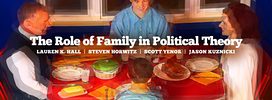Scott argues that the fact that so few children live with non-biological relatives suggests that “sex, procreation, and education are all related somehow. The old view would be that sex and procreation are united under a larger institution called marriage or monogamy.” Of course they’re related, because until very recently, it was very unlikely you would have children if you were not a fertile heterosexual. Now, of course, things have changed. I suppose my argument about reproduction as the foundation for even same-sex marriage is based on anecdotal evidence from the individuals in same-sex marriages I know. Most of my gay friends desire children and have sought out the means to have children, whether through sperm donation, surrogacy, or adoption. Technological limitations therefore explain a big part of the pattern Scott points out. But, as with many new technological changes, people will be very likely to use these new technologies to fulfill their natural desires as human beings. I see little difference between a gay couple fulfilling their desire for reproduction and child-rearing through artificial insemination and a straight couple doing the same thing. Having children, for many if not most married couples, is a fulfillment of the desires of the two partners for a greater union through the creation of a loving family. Scott’s discussion here ignores the universal desires, shared by most individuals, for monogamous coupling and the raising of children. How those children get here seems less important to me than how they are loved once they arrive.
Steve’s post, on the other hand, slightly misses the mark from the other side. I agree in broad terms with Steve’s characterization of the new moderate family and all the benefits we’ve received from the shift away from patriarchal family as a unit of production. That being said, there are genuine concerns about specific family forms for societies based on free and responsible individuals. Families, as Steve knows, are the foundation for the manners and mores that make the Great Society possible. Certain family forms, single-parenthood and polygamy among them, will struggle to form this kind of character, not because the people in these families are bad, but because the family form itself cannot serve as an adequate transmission device for those manners and mores. The failure of the family as transmitter of manners and mores requires more state intervention in the family and the erosion of the character that prevents the need for government intervention in other areas of life. The crisis is particularly acute among the urban poor. There are important economic and public policy recommendations to reduce the impact of drug laws and mass incarceration on the family, there is also some evidence, as Kay Hymowitz suggested this week, that the problem may be deeper than economic incentives can reach. Moderate supporters of the family need to be clear about the kinds of families the Great Society requires and also how we can encourage their formation.

